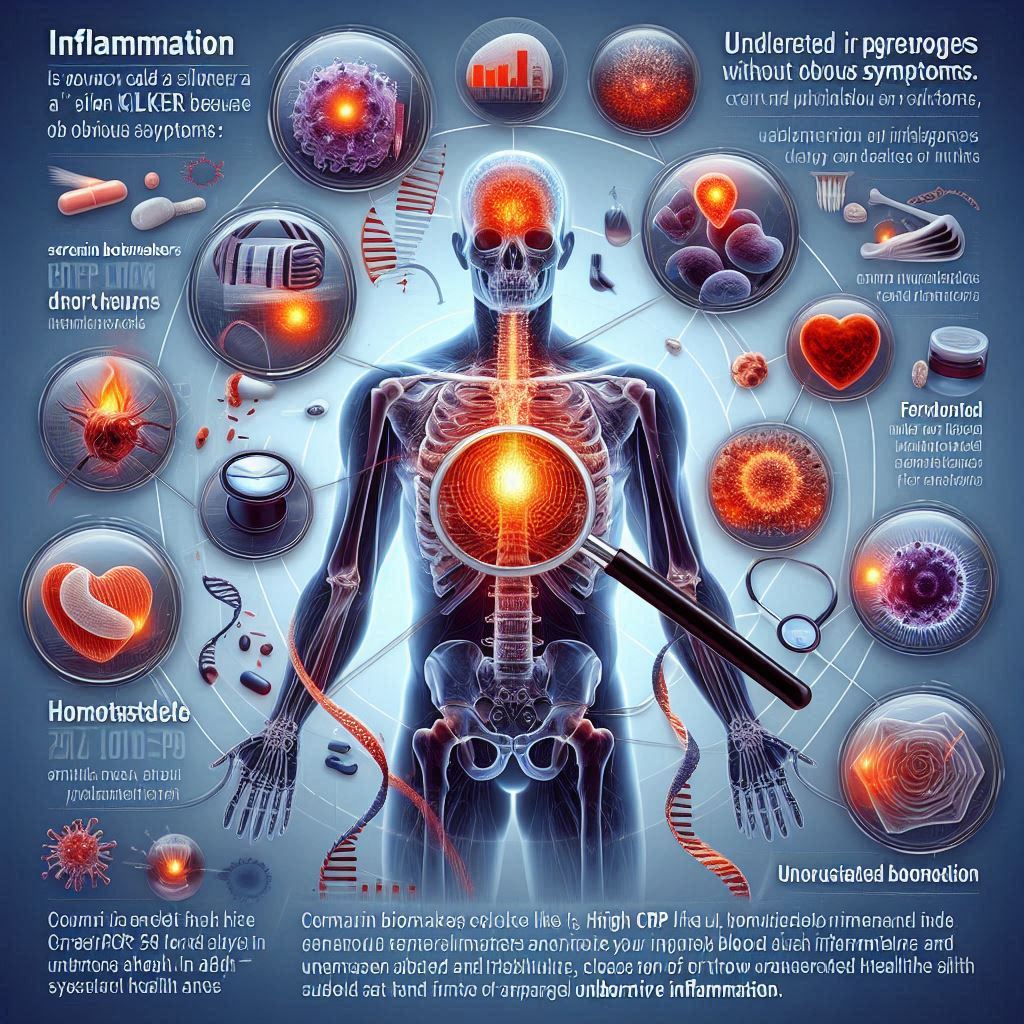Contents
- 1 Understanding the subtle signs of inflammation that could be wreaking havoc on your health
- 2 Prof. Aécio D’Silva, Ph.D AquaUniversity
- 3 What is Chronic Inflammation?
- 4 How Can Inflammation Be Silent?
- 5
- 6 Taming Inflammation: Treatment & Prevention
- 7
- 8 What are Elevated Levels of C-reactive protein (CRP), homocysteine, ferritin, blood sugar, and insulin?
- 9
- 10 Other Important Health Biomarkers
- 11
- 12 Conclusion:
Understanding the subtle signs of inflammation that could be wreaking havoc on your health
Prof. Aécio D’Silva, Ph.D
AquaUniversity
Summary: Inflammation is often called a “silent killer” because it can progress without obvious symptoms. However, certain biomarkers like high CRP, homocysteine, ferritin levels, and unregulated blood sugar and insulin can signal underlying inflammation. This blog post will explore these hidden dangers and emphasize the importance of proactive health management.
Inflammation is a natural bodily response to injury or infection. It involves releasing chemicals that trigger a cascade of events, such as swelling, redness, and pain. While acute inflammation is essential for healing, chronic low-grade conditions can persist silently, damaging tissues and increasing the risk of various diseases.
What is Chronic Inflammation?
Chronic inflammation is a persistent state of low-grade inflammation that occurs over a prolonged period. Unlike acute condition, which is a short-term response to injury, chronic conditions can simmer in the background, often without noticeable symptoms.
How Can Inflammation Be Silent?
Chronic inflammation can be insidious because it often doesn’t present with the typical signs of acute condition, such as pain, redness, and swelling. Instead, it can manifest through more subtle and often overlooked symptoms:
-
Elevated C-Reactive Protein (CRP):
- CRP is a protein produced by the liver in response to inflammation.
- High levels of CRP can indicate an underlying condition, even in the absence of obvious symptoms.
- Conditions associated with elevated CRP include heart disease, rheumatoid arthritis, and inflammatory bowel disease.
-
Elevated Homocysteine:
- Homocysteine is an amino acid that can build up in the blood when certain nutrients, such as vitamin B12 and folate, are deficient.
- High levels of homocysteine are linked to increased conditions and an elevated risk of heart disease, stroke, and dementia.
-
Abnormal Ferritin Levels:
- Ferritin is a protein that stores iron in the body.
- While iron is essential, both iron deficiency and iron overload can contribute to inflammation.
- Abnormal ferritin levels can be associated with various conditions, including liver disease, autoimmune disorders, and certain cancers.
-
Unregulated Blood Sugar and Insulin:
- High blood sugar levels (hyperglycemia) and insulin resistance can trigger chronic inflammation.
- This is a key factor in the development of type 2 diabetes and its associated complications.
- Even in the absence of diabetes, consistently high blood sugar levels can contribute to inflammation throughout the body.
-
Fatigue:
- Persistent fatigue can be a subtle sign of chronic inflammation.
- When the body is constantly battling inflammation, it can lead to a state of low-grade exhaustion.
-
Digestive Issues:
- Chronic inflammation can affect the digestive system, leading to symptoms like bloating, gas, and changes in bowel habits.
- Conditions like inflammatory bowel disease (IBD) are characterized by chronic inflammation of the digestive tract.
-
Skin Problems:
- Skin conditions like eczema and psoriasis are often associated with underlying inflammation.
- These conditions can manifest as itchy, scaly, or inflamed skin.
This is for informational purposes only. For medical advice or diagnosis, consult a professional.
Taming Inflammation: Treatment & Prevention
Inflammation is your body’s natural response to injury or infection, but chronic inflammation can silently damage your health. Here’s how to tackle it:
-
Dietary Powerhouse:
-
- Anti-Inflammatory Foods: Eat fruits, vegetables (especially leafy greens), fatty fish (salmon, tuna, mackerel), nuts, seeds, and olive oil. These are rich in antioxidants and omega-3 fatty acids, which help combat inflammation.
- Limit the Culprits: Minimize processed foods, sugary drinks, refined carbohydrates (white bread, pasta), and excessive red meat. These can fuel inflammation.
-
Lifestyle Shifts:
-
- Move Your Body: Regular exercise, like brisk walking, cycling, or swimming, can significantly reduce inflammation.
- Stress Management: Chronic stress can increase inflammation—practice relaxation techniques like 478-Psalm-23-breathing-meditation, or deep breathing exercises.
- Quality Sleep: Aim for 7-9 hours of quality sleep per night.
- Hydration: Drink plenty of water throughout the day.
-
Consider Supplements (Consult with your doctor first):
-
- Omega-3 Fatty Acids: Fish oil supplements can provide anti-inflammatory benefits.
- Turmeric: Curcumin, the active compound in turmeric, has potent anti-inflammatory properties.
- Ginger: Ginger can help reduce inflammation and ease pain.
-
Medical Interventions (If necessary):
-
- Medications: Sometimes, your doctor may prescribe non-steroidal anti-inflammatory drugs (NSAIDs) or corticosteroids to help manage the condition.
What are Elevated Levels of C-reactive protein (CRP), homocysteine, ferritin, blood sugar, and insulin?
Elevated levels of C-reactive protein (CRP), homocysteine, ferritin, blood sugar, and insulin which may indicate inflammation, infection, injury, or chronic disease are:
C-reactive protein (CRP)
- Elevated: CRP levels of 8 mg/L or higher are considered high.
- Moderate increase: CRP levels of 1–10 mg/dL are considered a moderate increase.
- Marked increase: CRP levels greater than 10 mg/dL are considered a marked increase.
- Severe inflammatory process: CRP levels greater than 40 mg/L combined with ferritin levels greater than 1,000 ng/mL can indicate a severe inflammatory process.
Homocysteine
- Intermediately elevated
Homocysteine levels between 31–100 ?mol/L are considered intermediately elevated.
- Severely elevated
Homocysteine levels greater than 100 ?mol/L are considered severely elevated.
Ferritin
- Elevated: Ferritin levels greater than 1,000 ?g/L are considered elevated.
- Normal: Normal ferritin levels vary by age and sex.
Blood sugar
- High: Blood sugar levels of 140 mg/dL or higher are considered high (hyperglycemia).
Insulin
Here are some general guidelines for insulin levels:
- Less than 10 uIU/mL: Often considered optimal or ideal
- Less than 20 uIU/mL: Considered good
- Around 25-35 uIU/mL: Typically regarded as fair
- Above 40 uIU/mL: This could indicate early insulin resistance
However, there’s no agreement among experts about what’s normal, low, or high because everyone is different. Factors that can affect your insulin levels include:
- Health conditions: Obesity and diabetes can affect what a “normal” level might be.
- Test results: Results may vary depending on your age, gender, health history, and the lab used.
- Insulin resistance: When you have insulin resistance, your pancreas must work harder to manage your blood sugar levels by releasing extra insulin.
Other Important Health Biomarkers
In addition to the markers above mentioned, here are some other important health markers to monitor:
- Blood Pressure: High blood pressure, or hypertension, is often called a “silent killer” because it can lead to heart disease and stroke without showing symptoms.
- Cholesterol Levels: Monitoring both LDL (“bad” cholesterol) and HDL (“good” cholesterol) is crucial for heart health.
- A1C (Blood Glucose): This marker provides a picture of your blood sugar levels over time and is important for managing diabetes.
- Triglycerides: High levels of these fats in your blood can increase the risk of heart disease.
- Waist Circumference: This can be an indicator of visceral fat, which is linked to metabolic syndrome and other health issues.
- Vitamin D Levels: Essential for bone health and immune function.
- Resting Heart Rate: A lower resting heart rate generally indicates better cardiovascular fitness.
Keeping an eye on these markers can help you maintain a comprehensive view of your health.
Conclusion:
Chronic inflammation can silently wreak havoc on your health, increasing your risk of serious diseases. By understanding the subtle signs, such as elevated CRP, homocysteine, and ferritin levels, along with unregulated blood sugar and insulin, you can take proactive steps to address the underlying condition.
References:
https://www.webmd.com/diet/anti-inflammatory-diet-road-to-good-health
https://www.scripps.org/news_items/4232-six-keys-to-reducing-inflammation
https://fitonapp.com/wellness/important-health-markers/.
Disclaimer: This blog post is for informational purposes only and should not be considered medical advice. Always consult with a qualified healthcare professional for any health concerns or before making any decisions related to your health.








